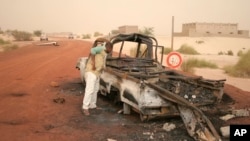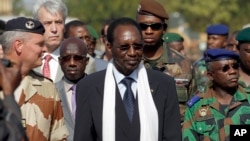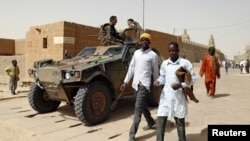DAKAR —
Human rights groups say Malian troops and Islamic militants have committed grave rights violations including summary executions and the use of children in combat. The groups say Mali must act quickly to investigate the alleged crimes and to avoid a spiral of reprisal attacks and impunity.
Bodies dumped in wells and families desperate for news of disappeared loved ones point to rampant crimes human rights groups say have been committed by both the Malian army and Islamic militants.
Following a United Nations Security Council resolution in December, the military battle for northern Mali was expected to begin later this year with the deployment of a West African force. But an early January advance by the Islamic militants into the town of Konna triggered fighting and eventual intervention by the French.
Konna is close to the Malian garrison town of Sévaré at the edge of the government-controlled south.
Corinne Dufka, a senior Africa researcher with Human Rights Watch, says Malian soldiers summarily killed civilians they suspected of being associated with the militants, based on what Dufka called “flimsy evidence”.
"Individuals were detained at the bus station and then walked about 100 meters down the road and executed and then dumped into one of four quite deep wells," she said. "We spoke with witnesses and individuals with knowledge of these incidents; they described at least 12 men being killed in this way."
Mali’s interim president Dioncounda Traoré told French radio this week that if a member of the Malian army or pro-government militias is found to have committed crimes, they will be brought to justice.
Florent Geel, head of the Africa office of the International Federation for Human Rights, says there must be an investigation in the Malian army and perpetrators brought to justice. He says of course this is not about the entire Malian military - we are talking about some individuals. He says it is critical that they be prosecuted to demonstrate that any such acts are unacceptable, on whatever side they occur.
Human Rights Watch and other rights monitors say Islamic militants, recently accused of grave abuses including mutilating civilians during their occupation of the north, where they enforced a strict interpretation of Sharia, have also committed crimes in the latest fighting.
People in the town of Diabaly told Amnesty International that they saw children alongside the militants, some as young as 10 years old, armed with rifles. Amnesty says there are reports that Islamic militants killed several Malian soldiers and a civilian in Diabaly.
Beyond combat-related crimes, human rights activists are worried about a cycle of violence and impunity that could spread to the civilian population.
Tuareg separatists
As in the past when the Malian government battled Tuareg separatists in the north, in recent weeks there have been attacks on Arab and Tuareg suspected of being linked to the jihadist groups simply because of their race.
The International Federation for Human Rights is warning against a cycle of violence. The head of its Africa office, Florent Geel, says anyone who knows Mali knows that these intercommunity tensions go way back. All Malians remember these times of bloody rebellion and counter-rebellion. We’re saying watch out - don’t fall into another cycle of violence and impunity, he says. Perpetrators of crime - be they Malian army or militants - must be brought to justice.
Need for justice
Geel said it is critical that justice be properly carried out so that the people see that vigilante justice among civilians is not the solution.
Human rights advocates, like Human Rights Watch's Corrine Dufka, say they are encouraged by reports that when French and Malian forces reached the northern city of Gao, the Malian army showed more discipline.
"In Gao, our sources there are telling us that the Malian army has been quite professional," said Dufka. "They have been working to stop looting. They have been urging the population to hand over anyone suspected so that they can detain them and ensure that they are properly investigated."
The U.N. Security Council resolution backing a West African military force in Mali includes a number of provisions to ensure the protection of human rights. Human rights experts applauded the measures. Geel said it is critical to enforce the measures as soon as possible.
Bodies dumped in wells and families desperate for news of disappeared loved ones point to rampant crimes human rights groups say have been committed by both the Malian army and Islamic militants.
Foreign Troop Commitments to Mali
Foreign Troop Commitments to Mali- France 2,000 on the ground, 500 more committed
- Chad to send 2,000
- Nigeria to send 1,200
- Benin to send 650
- Burkina Faso, Niger, Senegal, Togo have committed 500 each
- Guinea and Ghana are also sending troops
Konna is close to the Malian garrison town of Sévaré at the edge of the government-controlled south.
Corinne Dufka, a senior Africa researcher with Human Rights Watch, says Malian soldiers summarily killed civilians they suspected of being associated with the militants, based on what Dufka called “flimsy evidence”.
"Individuals were detained at the bus station and then walked about 100 meters down the road and executed and then dumped into one of four quite deep wells," she said. "We spoke with witnesses and individuals with knowledge of these incidents; they described at least 12 men being killed in this way."
Mali’s interim president Dioncounda Traoré told French radio this week that if a member of the Malian army or pro-government militias is found to have committed crimes, they will be brought to justice.
Florent Geel, head of the Africa office of the International Federation for Human Rights, says there must be an investigation in the Malian army and perpetrators brought to justice. He says of course this is not about the entire Malian military - we are talking about some individuals. He says it is critical that they be prosecuted to demonstrate that any such acts are unacceptable, on whatever side they occur.
Human Rights Watch and other rights monitors say Islamic militants, recently accused of grave abuses including mutilating civilians during their occupation of the north, where they enforced a strict interpretation of Sharia, have also committed crimes in the latest fighting.
People in the town of Diabaly told Amnesty International that they saw children alongside the militants, some as young as 10 years old, armed with rifles. Amnesty says there are reports that Islamic militants killed several Malian soldiers and a civilian in Diabaly.
Beyond combat-related crimes, human rights activists are worried about a cycle of violence and impunity that could spread to the civilian population.
Tuareg separatists
As in the past when the Malian government battled Tuareg separatists in the north, in recent weeks there have been attacks on Arab and Tuareg suspected of being linked to the jihadist groups simply because of their race.
The International Federation for Human Rights is warning against a cycle of violence. The head of its Africa office, Florent Geel, says anyone who knows Mali knows that these intercommunity tensions go way back. All Malians remember these times of bloody rebellion and counter-rebellion. We’re saying watch out - don’t fall into another cycle of violence and impunity, he says. Perpetrators of crime - be they Malian army or militants - must be brought to justice.
Need for justice
Geel said it is critical that justice be properly carried out so that the people see that vigilante justice among civilians is not the solution.
Human rights advocates, like Human Rights Watch's Corrine Dufka, say they are encouraged by reports that when French and Malian forces reached the northern city of Gao, the Malian army showed more discipline.
"In Gao, our sources there are telling us that the Malian army has been quite professional," said Dufka. "They have been working to stop looting. They have been urging the population to hand over anyone suspected so that they can detain them and ensure that they are properly investigated."
The U.N. Security Council resolution backing a West African military force in Mali includes a number of provisions to ensure the protection of human rights. Human rights experts applauded the measures. Geel said it is critical to enforce the measures as soon as possible.






